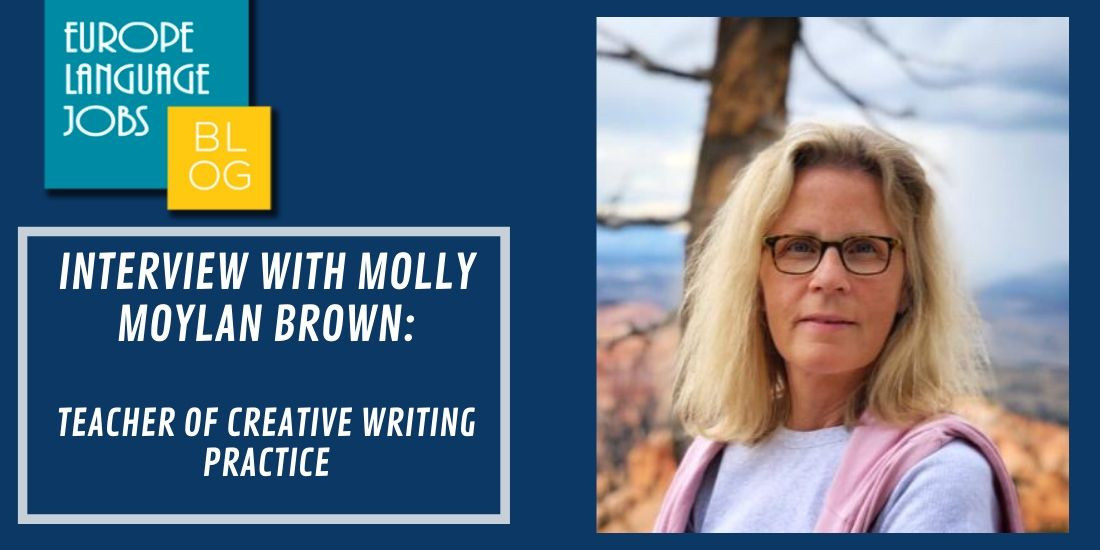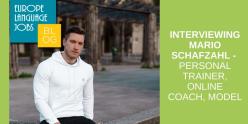Molly Moylan Brown is a popular teacher of Creative Writing Practice - a methodology she has developed over many years to help participants develop narrative skills beneficial to writers and non-writers alike. Raised bilingually and multiculturally, she has enjoyed a successful career as an actor, theatre director, creative writing teacher, writing coach, and community activist. With degrees in Philosophy, Theatre, Film, and Creative Writing, she collaborates with other creative and arts practitioners to offer workshops, retreats, and corporate training. She splits her time between New York City and Berlin.
When/How did you discover your interest in creative writing?
As a seasoned actor and theatre director, I was always interested in creative writing. I founded and for many years ran a production company in New York that provided customized entertainment and specially designed workshops in collaborative creative writing and improvisation. A critical understanding of narrative structures and storytelling is invaluable to both the stories inside which we live and those we can imagine. I learned early in my career that dwelling in possibility, collaborating with others, and building a creative community were my joy and calling.
What motivated you to do the work you primarily do today?
The desire to build small communities of social capital, a place where writers and non-writers alike could find and strengthen their authentic voices in a supportive and generative atmosphere. There is great joy to be found in a space focused on making sense of the narrative of our lives and using that understanding to invent and develop new stories — a space where everyone has a seat at the table and learns to share their stories and offer quality attention and listening to others. I love working with an element of surprise in the exercises I create and the positive feedback of participants clearly says they enjoy it, too. The creative spirit is invigorated by variety, novelty, and surprise!
What would your advice be to non-native English speakers who would like to take a creative writing practice course?
My workshops are international in scope, comprised of native and non-native English speakers. It’s not an English class. It’s a class for creative expression, finding the heart of a narrative, and experiencing the freedom of writing in a spontaneous way while learning the building blocks of a good story. No less than the native English speakers, my international participants experience the joy of spontaneous writing in a second language with others, while also enriching their understanding and use of English.
Could you explain the value of a Creative Practice for the younger generation?
The value of understanding and developing a compelling story, from a place of authenticity, applies to EVERYONE. Participants learn to challenge, expand, and reimagine the stories they tell themselves about the world and their place in it. In all professions, having a command of story-building skills opens up possibilities for personal growth and powerful communication. Committing to a dedicated practice with others of focused spontaneous creative expression counters the unproductive habit of continuous partial attention. Sharing stories that arise in these guided gatherings helps to deepen empathy and strengthen participants’ authentic voices while opening windows to cross-cultural understanding. For the individual, writing and giving voice to their stories helps to clarify their desires and particular strengths as well as what might be impeding their progress.
Is this a good time for people in quarantine to try creative writing?
There really isn’t a better time for people to explore and dedicate themselves to new practices. Creative Writing Practice is a kind of meditation through writing, it asks us to be ‘right here, right now,’ raw and unfiltered. It offers a tool for coming into ‘present,’ staying grounded, and finding our ‘inner artist.’ During a period of confinement, such a practice opens up possibilities for the ‘inward journey,’ a way of recording this moment and discovering what is truly important and urgent in our lives. Finding the spaciousness, malleability, and power of our creative imagination through writing can drive the formation of a new, better normal of our selves. More than journaling, undertaking this practice in community with others can be a bonding, deeply resonant experience with a lasting beneficial impact on the individual journey we must each take.
How has COVID-19 affected your business? Have you had to change the way your business operates?
I am busier than ever. While I already taught an international online creative writing course, all of my courses have recently moved online and I’ve added more. Nothing beats the live experience of writing together in a shared physical space (classroom or retreat), but I have been astonished by how powerful and popular the online classes have been. During a period when we are experiencing such a vivid, shared backdrop that has challenged us to recalibrate, this moment also affords us so much stillness with great swaths of time for analytic and reflective attention, daydreaming, and a renewed focus on self-improvement through the development of new practices. As strange as it sounds, it’s actually a great time to be writing! Especially with others!
What 2 pieces of advice would you offer to people about discovering their passion?
First, accumulate skills and experiences of all kinds throughout your life. This will bring into relief all that animates your life and ignites your passion. Remain a student, always seeking knowledge. This has many benefits, not least in aiding the discovery of your true purpose and how you can best contribute in this life to the environment and others, both vocationally and avocationally.
Second, read. Being inside a story gives us a chance to play all the parts and imagine what we would do — it helps us to slow down, to hold and appreciate life’s complexities. Reading increases our emotional intelligence. Reading also calms, relaxes, and reduces stress - it is, as poet Beth Ann Fennelly says, ‘slow medicine for the imagination.’ Reading and writing potentiate one another.
Feeling inspired by Molly's wise words? For further information or queries regarding upcoming Creative Writing Practice Workshops, please contact Molly at [email protected].







Riku silva1y ago
thanks
thanks